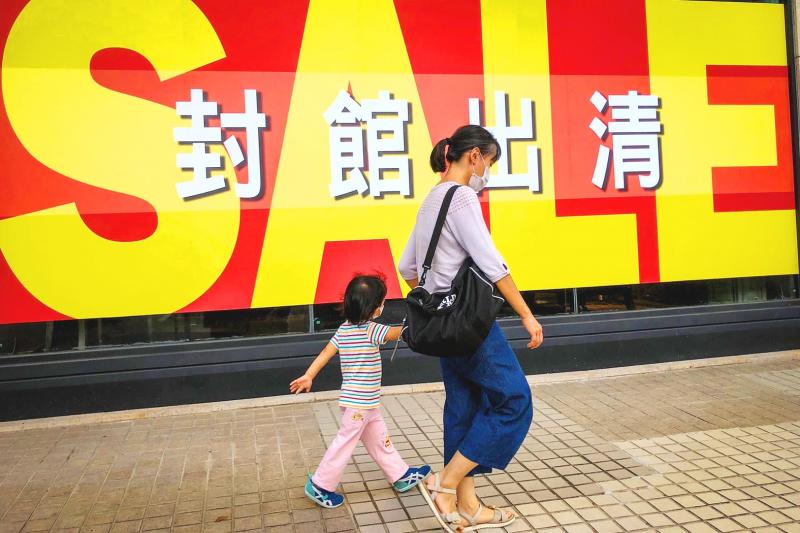Taiwan’s economy contracted 0.73 percent last quarter, missing the government’s May forecast by 1.23 percentage points, as private consumption took a hard hit from the COVID-19 outbreak, the Directorate-General of Budget, Accounting and Statistics (DGBAS) said yesterday.
It is the first decline since the first quarter of 2016 and the worst decline since the global financial crisis in 2009, DGBAS National Income Section head Yu Ming-chun (游敏君) said.
The statics agency earlier predicted 0.53 percent growth for the April-to-June period, but the pandemic wreaked bigger havoc than expected, Yu said.

Photo: CNA
The seasonally adjusted annual rate contracted for the second consecutive quarter by 8.82 percent, widening from a 3.57 percent fall three months earlier, and pushed Taiwan into a technical recession.
“Sluggish private consumption is no doubt the main drag, as tourism activity came to an abrupt halt last quarter,” Yu said.
Outbound travel plunged 98.94 percent from a year earlier, deeper than a 49.17 slump in the first quarter, the agency’s report said.
Consequently, overseas travel expenses nosedived 96.39 percent, wiping out private consumption by 6 percentage points, resulting in a 5.13 percent decline, it said.
Retail sales dropped 5.76 percent, while restaurant revenues shrank 12.36 percent, the agency said.
The amount of trips on trains — including metropolitan, railway and high-speed trains — fell 20 to 30 percent, while revenue for domestic airline companies dwindled 92.86 percent, it said.
Travel restrictions forced people to stay in Taiwan and shifted some travel spending from abroad to the local market, Yu said, adding that the domestic travel industry would benefit this quarter.
Despite border controls remaining in place, the overall situation would improve as Taiwanese have largely resumed social gatherings, shopping, dining and domestic trips, Yu said.
The DGBAS is to update its growth forecast on Aug. 14.
Capital formation bucked the trend and shored up GDP by 2.19 percentage points, as local semiconductor firms bought new equipment to meet expansion needs and maintain technology leadership, the agency said, adding that government spending on infrastructure projects also benefited the economy.
Exports, traditionally the key growth driver, decreased 2.42 percent due to soft demand for mineral, base metal and plastic products, it said.
High-tech electronic components fared strong with a 20.32 percent increase, thanks to 5G deployment, and remote working and learning, while information and communication products expanded 12.52 percent from a year earlier for similar reasons, Yu said.
Imports declined 4 percent, allowing external demand to contribute 0.1 percentage point to GDP, she added.

ADVANCED: Previously, Taiwanese chip companies were restricted from building overseas fabs with technology less than two generations behind domestic factories Taiwan Semiconductor Manufacturing Co (TSMC, 台積電), a major chip supplier to Nvidia Corp, would no longer be restricted from investing in next-generation 2-nanometer chip production in the US, the Ministry of Economic Affairs said yesterday. However, the ministry added that the world’s biggest contract chipmaker would not be making any reckless decisions, given the weight of its up to US$30 billion investment. To safeguard Taiwan’s chip technology advantages, the government has barred local chipmakers from making chips using more advanced technologies at their overseas factories, in China particularly. Chipmakers were previously only allowed to produce chips using less advanced technologies, specifically

BRAVE NEW WORLD: Nvidia believes that AI would fuel a new industrial revolution and would ‘do whatever we can’ to guide US AI policy, CEO Jensen Huang said Nvidia Corp cofounder and chief executive officer Jensen Huang (黃仁勳) on Tuesday said he is ready to meet US president-elect Donald Trump and offer his help to the incoming administration. “I’d be delighted to go see him and congratulate him, and do whatever we can to make this administration succeed,” Huang said in an interview with Bloomberg Television, adding that he has not been invited to visit Trump’s home base at Mar-a-Lago in Florida yet. As head of the world’s most valuable chipmaker, Huang has an opportunity to help steer the administration’s artificial intelligence (AI) policy at a moment of rapid change.

The New Taiwan dollar is on the verge of overtaking the yuan as Asia’s best carry-trade target given its lower risk of interest-rate and currency volatility. A strategy of borrowing the New Taiwan dollar to invest in higher-yielding alternatives has generated the second-highest return over the past month among Asian currencies behind the yuan, based on the Sharpe ratio that measures risk-adjusted relative returns. The New Taiwan dollar may soon replace its Chinese peer as the region’s favored carry trade tool, analysts say, citing Beijing’s efforts to support the yuan that can create wild swings in borrowing costs. In contrast,

TARIFF SURGE: The strong performance could be attributed to the growing artificial intelligence device market and mass orders ahead of potential US tariffs, analysts said The combined revenue of companies listed on the Taiwan Stock Exchange and the Taipei Exchange for the whole of last year totaled NT$44.66 trillion (US$1.35 trillion), up 12.8 percent year-on-year and hit a record high, data compiled by investment consulting firm CMoney showed on Saturday. The result came after listed firms reported a 23.92 percent annual increase in combined revenue for last month at NT$4.1 trillion, the second-highest for the month of December on record, and posted a 15.63 percent rise in combined revenue for the December quarter at NT$12.25 billion, the highest quarterly figure ever, the data showed. Analysts attributed the